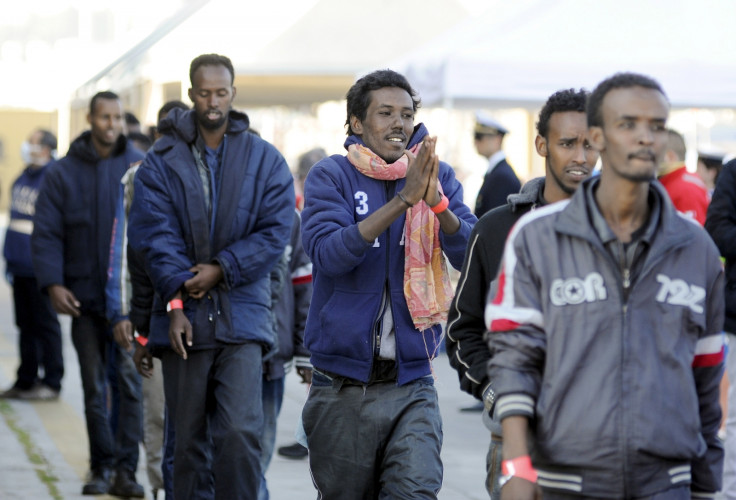Italy migrants influx: Libya is living hell somewhere 'between the Devil and deep blue sea'

Italian authorities say a new group of migrants is trying to escape from Libya to Italy for fear of increasing beatings, kidnappings and even death at the hands of Libyan tribesmen.
Typically, Italian authorities rescue asylum seekers who are fleeing from wars or persecution in countries such as Syria or Eritrea, women who are victims of trafficking for the European sex trade and those wanting to leave for economic reasons.
But officials are warning that an increasing number of "resident migrants" are now starting to flee Libya's security vacuum.
While migrants have always considered Libya to be a country of transit, resident migrants are people who work and have resided in the country for years, some for more than a decade.
"We are now witnessing an increasing number of migrants who have been living in Libya for years and have no other choice but leave because they are targets of Libyans' violence," Flavio Di Giacomo, a spokesperson for the International Organisation for Migration (IOM) Rome, told IBTimes UK.
'Between the Devil and the deep blue sea'
These migrants, especially those living in areas such as Zuhara or Misrata, have told IOM that they had no other choice but to attempt the crossing because the situation in Libya is "out of control".
A 24-year-old man who had just been rescued after making the trip from Libya and arrived at Lampedusa's immigrant reception centre told IOM how he "wouldn't wish his worst enemy to go to Libya".
"When you're in Libya, you're between the Devil and the deep blue sea," he said, referring to the threats faced by migrants.
While the young man said he knew "that they would suffer", he explained "that they never expected to be victims of such brutal violence and abuses in Libya".
Easy targets for brutality
Many resident migrants in Libya are organised in districts, working for the same companies where they become easy targets, according to Di Giacomo, who added that migrants can be extorted for money in the street and are beaten if they are not able to pay.
There have been reports of migrants kidnapped by tribal groups for ransom with families in their countries of origin asked for money in exchange for the migrants' safe release.
"Migrants have also told us that if they don't give the money they are also beaten, or sometimes killed," Di Giacomo said.
He continued: "They are really afraid of going in the streets. Considering the impossible situation they face in Libya now, many of them decide to come to Europe, and they fall victim to these smugglers who offer them the possibility to come to cross to Italy."
Forced to cross with knives
Once employed residents of Libya, these desperate individuals turn to Somali, Nigerian or Ugandan smuggling intermediates, who offer the possibility of crossing into Italy by boat.
"The problem is that when they fall in the hands of the smugglers, the situation worsens because they are gathered with other migrants in these so-called 'connection houses' where they are even more subject to beatings and violence."
After paying for the crossing, migrants are brought to these facilities in Tripoli, Misrata and Zuwara. Often little more than apartments or garages, they are the want-away migrants' home for days and even weeks as they await transport by truck to beach departure points.
According to testimonies, hundreds of migrants often become victims of violence and abuse perpetrated by the smugglers in these holding areas, which are typically no larger than 100 to 150 sq m and include minimal toilet facilities.
"Women may be raped. Even when migrants have already paid, smugglers may ask for more money and beat them," Di Giacomo said.
A number of migrants, after deciding against making the crossing, have been forced onto the boats by the smugglers as scars on their bodies can attest.
"I personally met migrants who were cut with knives by the smugglers in order to scare them to get on board. Other times, they have scars made by sticks and guns.They are treated like objects and are not seen as human beings," Di Giacomo added.
While these stories typically came from Sub-Saharan nationals, a number of Syrians are also starting to face this harrowing brutality.
"That's why there are more migrants wanting to arrive in Europe," Di Giacomo said.
© Copyright IBTimes 2025. All rights reserved.






















